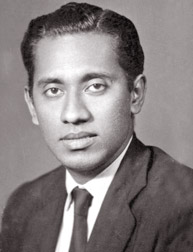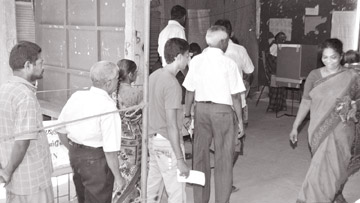Avoiding extremes – lessons of last Saturday’s election
Prof Rajiva Wijesinha, MP
I was not entirely surprised by the results of Saturday’s Local
Government election. I had said I thought the government should be happy
if it got 30 percent of the vote in the North. It got less in most
places, but it managed at least 20 percent almost everywhere, which it
should see as a good base on which to build. It also managed to do
comparatively well in Kilinochchi, which is where it had concentrated
its development efforts.
Interestingly, the TNA had allowed the TULF to contest two of the
three Pradeshiya Sabhas in Kilinochchi that voted last Saturday, and in
both those the government got over 40 percent of the vote. In fact it
did almost as well as the TULF in Poonakary, and had the SLMC contested
together with the government, it might well have won.
 |
|
Alfred
Duraiyappa |
In Karachi on the other hand, where there were the greatest number of
allegations of strong-arm tactics, it did much worse. Whether or not
elements in or close to government were responsible for whatever
prompted the allegations, I hope this will serve to convince government
that any trace of strong-arm tactics can only be counter-productive.
National parties
In this context I reiterate what I told the TNA after the allegations
that members of the forces had disrupted one of their meetings. They
were obviously so pleased by the incident that, on the legal principal
of ‘Cui bono?’, it seemed that they must have been responsible. Equally
obviously, though they understood how beneficial the incident had been -
and indeed noted that, whereas that meeting had been poorly attended,
their next meeting saw a much larger crowd - they were not behind what
had happened, and I hoped that whoever had been responsible realized
that the only possible beneficiaries were the TNA.
For government must realize that the electors of Jaffna are both
sensitive and intelligent, and will not give in to force. They have
always asserted their independence, and in that regard government should
actually be pleased that they did much better in these elections than
national parties have done for many decades. Except for Alfred
Duraiyappa, who was killed by the LTTE as a consequence, national
parties have not been in control of any local body for over half a
century. Indeed we need to remember how badly the UNP did in the
District Development Council elections after the burning of the Jaffna
Public Library in 1981. Whereas previously it had hoped to give the TULF
a good run for its money, it created such animosity by its attempt at
intimidation, that if memory serves me right, it failed to win a single
seat.
Government should then be satisfied that, where it concentrated on
its record of service and development, it did comparatively well. It
should realize therefore that this is what it should concentrate on, and
that intimidation will not work. In particular it should remember what
happened when the UNP got angry with the Tamil people for failing to
support it in the 1981 DDC election, in the 1982 Presidential election,
and most markedly in the 1982 referendum when only they resisted the
intimidation that had taken place in the rest of the country. Influenced
then by the nasties in his party, in particular Cyril Mathew, J R
Jayewardene allowed open season on Tamils, first in the attacks on
Tamils outside Colombo in August 1981 and then - even though the elite
Tamils had supported him in 1982 - in the even more appalling attacks on
July 1983.
Those actions have since governed perceptions of Sri Lanka
internationally. This government, by its close relations with Tamil
parties that resisted the LTTE, by its expeditious resettlement of those
who had been displaced, by its fantastic programme of infrastructural
development in which the East and the North have benefited most, have
shown that the racism of the Jayewardene era has been put behind. It
will be unfortunate if efforts to create disappointment with last
Saturday’s result contributes to advancement of Jayewardene style
reactions.
Infrastructural development
I would not indeed have thought such a reaction possible, but I
noticed an extraordinary assessment by a journalist who is generally
more sensible. The conclusion there was that peace and development have
no bearing on the minds of Tamil voters. Apart from the fact that this
is a misreading of the results insofar as Kilinochchi is concerned, for
it is there that peace and development have been brought after a lapse
of decades, it ignores the real progress made by government as compared
with the performance of national parties previously in the North.
Unfortunately people believe the rhetoric of those who cannot understand
that winning an election is not the only mark of success, and who
therefore engage in ridiculous predictions that are based on wishful
thinking rather than observation or study of historical trends.
 |
|
Northerners using their franchise at
the recently concluded LG polls. Picture by Nisshanka
Wijeratne |
Government therefore should see the results of the election in the
North as reasonably satisfactory and an indication of how best to move
forward. It should also recognize that for Jaffna, infrastructural
development alone is not enough, and unless greater attention is paid to
human resources development and mechanisms to channel the energies of a
sophisticated population into productive independent employment, the
opportunities presented by enhanced opportunities and connectivity will
be wasted.
Victory over terrorism
Where government has enormous reason for satisfaction is the results
in the South, which have made it crystal clear that the people have no
inclination whatsoever for the United National Party. I had thought that
government would do well to get 60 percent of the vote given recent
difficulties, but the people have shown that they still repose massive
confidence in the government. This in turn makes it more difficult for
those who are keen on regime change to pursue that agenda. I was
horrified recently when a senior official who deals with this country
from a position of authority suggested that perhaps Sri Lanka needed a
different leader for peacetime, even though he acknowledged the
distinctive contribution of President Mahinda Rajapaksa in the victory
over terrorism.
I asked him then whether he remembered his Tolstoy, not sure now, so
sadly has Western education declined in recent years, whether he would
be familiar with what should have be basic knowledge for any learned
professional. I was talking about the second epilogue to ‘War and
Peace’, which it turned out he did know. There, Tolstoy explores the
difference between the General who had defeated Napoleon and Czar
Alexander who then took the country forward, so that it was established
as a European power.
European Union
General Kutuzov, it should be noted, was an accomplished soldier, but
he always acknowledged the superiority of the Czar, and he understood
when he was no longer the right person to make decisions. I had explored
this question previously, in thinking of Sarath Fonseka’s ambitions and
the irony - if not the absurdity, or utter cynicism - of at least a few
Westerners thinking he was the right person to lead Sri Lanka in
peacetime.
I was intrigued then to find that the question of Sri Lanka needing a
different leader was raised again, albeit in a less dramatic form than
when the European Union Representative asserted that military men could
make very good leaders. I was told afterwards that I was not the first
person who had been addressed thus, which crystallized my view that
those who resent President Rajapaksa’s refusal to follow the agendas of
other countries are on the warpath again.
The votes case by the Sri Lankan people however make it crystal clear
that any alternative to the current government would be totally
unacceptable. Whether this will be considered relevant by those who do
not take seriously the democratic will of people in countries they would
like to control is another question.
But I suspect even they will realize that trying to enforce a change
through strong arm tactics will be more trouble than it is worth, and
therefore they would do better to use persuasion rather than
intimidation.
It is of course possible that they may decide to resort once more to
encouraging terrorism. I hope therefore that the most recent example of
how appalling terrorism can be will dissuade them. But it is also
important for the Sri Lankan government to refrain from anything that
might help those who want to resort to violence again.
An objective reading of the election results, with attention to the
past as well as the present, indicates the way forward for all of us
together.
|



